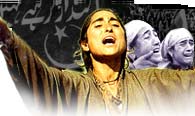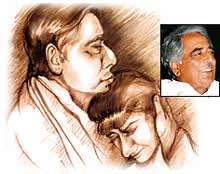

 |
 |
|
HOME | NEWS | SPECIALS | BLOOD IN THE SNOW

Chindu Sreedharan It is a short walk to the bus stop from the Lal Ded Memorial hospital in Srinagar. At 1525 hours on a cold Friday, Rubaiya Sayeed, a 23-year-old intern, stepped out on to the Iqbal Park road, turned right, and walked to the intersection ahead. Rubaiya was on her way home to Nowgam. Boarding a local mini-bus, she settled down to what she thought was another routine ride. At Ram Bagh two men got in. Except for a passenger, it was doubtful whether anyone read anything sinister in that. Certainly Rubaiya did not. The nightmare began at Bagat Kanipora. Three strangers suddenly materialised beside Rubaiya with guns. They forced her out of the bus into a waiting blue Maruti. The hour was 1545. It signalled the beginning of a 122-hour drama. Rubaiya's abduction was spurred by her father Mufti Mohammad Sayeed's appointment as independent India's first Muslim Union home minister. He had taken the oath in Delhi on December 2, 1989, just six days before. Sayeed, who was in Delhi then, came to know of the abduction two hours later. The Jammu and Kashmir Liberation Front, a pro-independence militant outfit, claimed credit for it through telephone calls. Their ransom: the release of five jailed colleagues. The Vishwanath Pratap Singh government -- then in power only for six days -- hurriedly constituted a Cabinet subcommittee comprising ministers Arun Nehru, Arif Mohammad Khan and Inder Kumar Gujral. In Srinagar, Jammu and Kashmir Chief Secretary Moosa Raza formed a special cell to tackle the crisis. The next day saw frantic attempts to establish contact with the militants. On December 10, they reiterated their demand: release the militants by 1900 hours on Monday or "Rubaiya's body will be thrown within Srinagar city." Negotiations began in earnest with Justice M L Bhat of the Allahabad high court as intermediary. The first deadline came and went; talks continued. Meanwhile, four of the five militants whose release was demanded were brought to Srinagar. Chief Minister Dr Farooq Abdullah, fresh-returned from an abandoned foreign tour, was dead against giving in. But the Centre had more or less decided to free the militants. December 13 saw Gujral and Arif Mohammad Khan landing in Srinagar with the prime minister's orders to release Abdul Hamid Sheikh, Sher Khan, Noor Mohammad Kalwal, Altaf Ahemed and Javed Ahemed Jargar. On Wednesday afternoon at 1505 hours, they were released in Rajouri Kadal in downtown Srinagar. Zafar Meeraj, a prominent journalist in the valley, received a telephone call an hour later. "We have got our boys," the JKLF spokesman told him in Urdu, "The girl will be with her parents soon." Another hour and Rubaiya was back with her family. "I had left her fate in the hands of the Almighty," said an overjoyed Sayeed, "She got a fresh lease of life." The release of the militants saw great euphoria in Kashmir. "There was no sympathy for Rubaiya. The people were all with the militants," recollects journalist Aasha Khosa who has spent the last 10 years in the valley. "The kidnapping was a shock. The security personnel did not have a clue. Till then everyone was treating militancy as a joke. People used to say, 'hey, my cousin has become a militant, he has a gun now...' The Rubaiya episode changed all that. It made people realise that there was major trouble in Kashmir. "When the militants were released there was celebration all around," she continues, "I have never seen so many people on the streets! They sang, danced and raised anti-India slogans." One of the slogans, Jo kare khuda ke khauf, Utale Kalashnikov (All god-fearing men, pick up the gun), was a pointer to how much the situation had deteriorated. Many say the abduction was the watershed in the Kashmir insurgency. Releasing the militants, this group holds, was nothing short of a blunder. "Had the V P Singh government not buckled down, things would have been different," they say, "The JKLF would not have harmed Rubaiya. People felt if they could get this done at gunpoint, then they could get independence too." Adds a senior police officer who served in Srinagar then. "The people saw India brought to her knees for the first time. It made them feel that azaadi (independence) was only a short distance away." Critics of this theory are plenty, Sayeed among them. They feel the incident was just another link in a long chain of events. "We have killed all the released militants and a few thousand more. Has that in anyway reduced militancy?" they ask, "If it wasn't Rubaiya, something else would have happened. Tension had been building up for years." True. Tension had been building up. The Rubaiya episode was fuelled by incidents that can easily be traced to the then Jammu and Kashmir chief minister Sheikh Mohammad Abdullah's death in September 1982. While he was alive Kashmir had a powerful leader. Years in jail had earned him the trust of the people. His word was their command; his persona strong enough to bend them to his will. This explains why, despite the 1975 Kashmir Accord between the Sheikh and Indira Gandhi, which many Kashmiris saw as betrayal, he was the king. It wasn't as if there were no troubles during the Sheikh's time. There were. In fact, many groups that were to turn militant had their roots in Abdullah's Plebiscite Front. The Jammu and Kashmir Liberation Front was active in the valley since 1965, and there were incidents of militancy from the late 1960s. "The seeds of militancy had always been present in Kashmir. There were outbursts from time to time, depending on how much mishandling there was from Delhi," says a Kashmir observer, "But Sheikh Abdullah could control it. Such was his personality that had he been alive today Kashmir would not be in turmoil." |
||||||||||||||||||||||||||||||||||||||